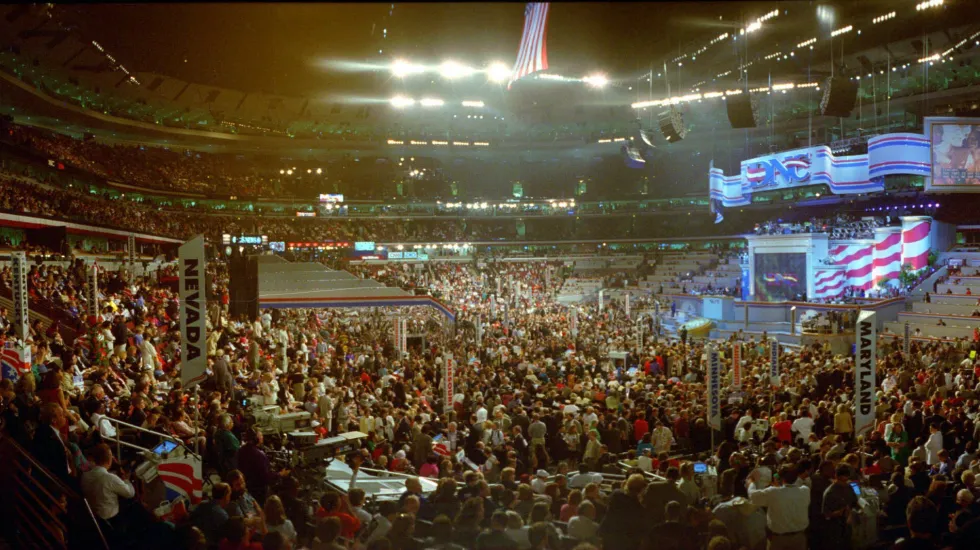
Chicago has a “compelling and convincing story to tell” about why it is the right choice to host the 2024 Democratic National Convention — in spite of its international reputation as a haven for violent crime, Mayor Lori Lightfoot said Thursday.
One day after joining the team of Democratic heavyweights in Illinois that went public with their interest in hosting the convention, Lightfoot played the role of Chicago cheerleader. The only things missing were the pompoms.
She argued Chicago is “ideally situated” to host its first political convention since 1996 and has the “strengths and bonafides” Democrats want and need: an abundance of hotel rooms; an array of restaurants that are the envy of the culinary world; and arts and culture second to none.
The Democratic National Committee has yet to release the specific criteria for interested convention cities. But Lightfoot said she is certain Chicago has “got it all” and is “not a one-stop shop.”
Mentioning Wintrust Arena, site of her 2019 inauguration, Lightfoot said the city has “expanded the offerings exponentially” since the nearly-flawless and picture-perfect 1996 Democratic National Convention at the United Center that exorcised the demons of 1968.
“I think we’ve got a very good and compelling story to tell — and a convincing story — that Chicago is the right choice, aside from all of the amenities that we can offer,” the mayor said.
“I will also say, we’re a really fun city in the summer time.”

Chicago closed the book on 2021 with 836 homicides, the highest total in a quarter-century. Despite incremental progress, shootings, carjackings and strong-arm robberies continue at troubling levels. Carjackings are through the roof.
Meanwhile, Chicago police officers are retiring in droves. Scores of officers have taken jobs in the suburbs or other states.
The Chicago Police Department is down to 11,730 sworn officers. In January 2019, it had 13,353.
On Thursday, Lightfoot was asked how she intends to convince her fellow Democrats to return to Chicago while the city is grapples with violent crime and a wave of carjackings that makes some motorists afraid to drive alone in daylight, let alone at night.
She replied by talking about “the progress that we’re making” and the fact that Chicago is not alone.
“The truth is, every major American city — and certainly those led by Democratic mayors — are facing the same kind of challenges that we’re facing,” Lightfoot said.
“I’m happy to report that, end of quarter, we’re down in shootings. We’re down in homicides. And we’re down in carjackings. Not enough. Not enough, I hasten to add. But we’re making real, meaningful progress.”
Downtown Ald. Brian Hopkins (2nd) served as “White House transportation coordinator” for the 1996 Democratic National Convention in Chicago.
In the days before Uber and Lyft, Hopkins oversaw a fleet of 25 Chevrolet SUVs parked at the Sheraton Chicago in Streeterville that shuttled VIP’s to and from the United Center. He worked from a “special guest list compiled by the White House.”
“I have fond memories of how well that event was managed. Even the weather. We had two perfect weeks of August weather in 1996. I remember people saying what a beautiful climate Chicago had. I would, of course, agree with them and secretly chuckle to myself, like, ‘If they only knew,’” Hopkins said.
“It was like the heavens smiled upon us for that particular event. We really got a lot of mileage out of it in terms of promoting Chicago’s image on an international scale. Not that it’s a guarantee that it would happen again. But certainly, the opportunity would be there if we get it right.”
Hopkins said he’s all for making another run at hosting the Democratic National Convention in Chicago even though 1996 will be difficult to duplicate.
“If we really focus on hosting a perfect event on an international stage, it can only help right now as we struggle to regain conventions and trade shows. As we talk about the impact of a possible casino on tourism, having a national convention could feed right into that,” Hopkins said.
“In ’96, we purged the ghost and stigma of the ’68 convention. If we were to have another one, we could really move the needle in terms of Chicago’s international reputation.”
Ald. Walter Burnett (27th), whose ward includes the United Center, said the 1996 convention “cleaned up the city” and made the West Loop and Fulton Market “what it is today.”
“It’s great for tourism. It highlights the city,” he said.
“And it would really make people see the better parts of Chicago, instead of the bad things they read in the newspaper [and see] on television.”








